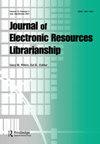Examination of academic librarian websites in Anglophonic countries to assess the integrity of information related to predatory publishing
Q3 Social Sciences
Journal of Electronic Resources Librarianship
Pub Date : 2023-10-18
DOI:10.1080/1941126x.2023.2271368
引用次数: 0
Abstract
AbstractThe debate on “predatory” publishing within academic scholarly communication continues. Blacklists (or watchlists) pertaining to “predatory” open access publishing by Jeffrey Beall, anonymous websites that cloned Beall’s blacklists, with or without updates, as well as a now-defunct blacklist, Dolos list, contain classification errors. During a Google search in 2021–2022, we found that dozens of academic libraries around the world, primarily in the USA, had continued to promote those blacklists. The list was revisited on 23 February 2023, focusing on libraries in seven Anglophonic countries, noting that 37 libraries were still promoting the Beall-based blacklists.Keywords: Academic and scholarly communicationblacklistsdisinformationopen accessquality NotesAuthors’ contributionsThe authors contributed equally to the intellectual discussion underlying this paper, literature exploration, writing, reviews and editing, and accept responsibility for the content and interpretation.DisclaimerAn earlier version of this paper was published as a preprint: https://doi.org/10.31235/osf.io/2xscwDisclosure statementNo potential conflict of interest was reported by the authors.Notes1 Select websites: https://predatoryjournals.com/ (now defunct); https://beallslist.net/; https://www.researchgate.net/post/List_of_Predatory_Journals_2019; https://predatory-publishing.com/info/; https://www.openacessjournal.com/blog/predatory-journals-list/2 RMH, RWH, PMCC and Victorian Mental Health, Health Sciences Library; Western Sydney University Library.3 Saint Mary’s University, Patrick Power Library; Eastern Michigan University Library; Frontier Nursing University Library; Hofstra University School of Medicine Library; Rutgers, The State University of New Jersey Library; Salisbury University Libraries.4 https://predatoryjournals.com/5 https://en.wikipedia.org/wiki/Predatory_publishing (last accessed: 23 February 2023)对英语国家学术图书馆网站的审查,以评估掠夺性出版相关信息的完整性
摘要学术传播中关于“掠夺性”出版的争论仍在继续。黑名单(或观察名单)与杰弗里·比尔(Jeffrey Beall)的“掠夺性”开放获取出版有关,匿名网站复制了比尔的黑名单,无论是否更新,以及现已不复存在的黑名单Dolos list,都包含分类错误。在2021-2022年的谷歌搜索中,我们发现世界各地的数十家学术图书馆,主要是在美国,继续推广这些黑名单。2023年2月23日,这份名单被重新审视,重点关注了7个英语国家的图书馆,并指出有37家图书馆仍在推广基于贝尔的黑名单。关键词:学术与学术交流黑名单虚假信息开放获取质量注释作者的贡献作者平等地参与了本文背后的智力讨论、文献探索、写作、评论和编辑,并对内容和解释负责。本文的早期版本为预印本:https://doi.org/10.31235/osf.io/2xscwDisclosure声明作者未报告潜在的利益冲突。注1:选择网站:https://predatoryjournals.com/(现已关闭);https://beallslist.net/;https://www.researchgate.net/post/List_of_Predatory_Journals_2019;https://predatory-publishing.com/info/;https://www.openacessjournal.com/blog/predatory-journals-list/2 RMH, RWH, PMCC和维多利亚精神健康,健康科学图书馆;3圣玛丽大学帕特里克·鲍尔图书馆;东密歇根大学图书馆;前沿护理大学图书馆;霍夫斯特拉大学医学院图书馆;罗格斯大学,新泽西州立大学图书馆;索尔兹伯里大学图书馆。4 https://predatoryjournals.com/5 https://en.wikipedia.org/wiki/Predatory_publishing(最后访问:2023年2月23日)
本文章由计算机程序翻译,如有差异,请以英文原文为准。
求助全文
约1分钟内获得全文
求助全文
来源期刊

Journal of Electronic Resources Librarianship
Social Sciences-Library and Information Sciences
CiteScore
1.50
自引率
0.00%
发文量
46
期刊介绍:
A journal for information professionals who work with managing electronic resources in libraries The Journal of Electronic Resources Librarianship (renamed from The Acquisitions Librarian to reflect the journal"s broader focus) provides a much-needed scholarly forum for librarians and other information professionals. This peer-reviewed quarterly journal addresses evolving work-related processes and procedure, current research, and the latest news on topics related to electronic resources and the digital environment"s impact on collecting, acquiring, and making accessible library materials. The journal provides opinion pieces, the latest news, book reviews, conference presentations, and e-resources related updates.
 求助内容:
求助内容: 应助结果提醒方式:
应助结果提醒方式:


